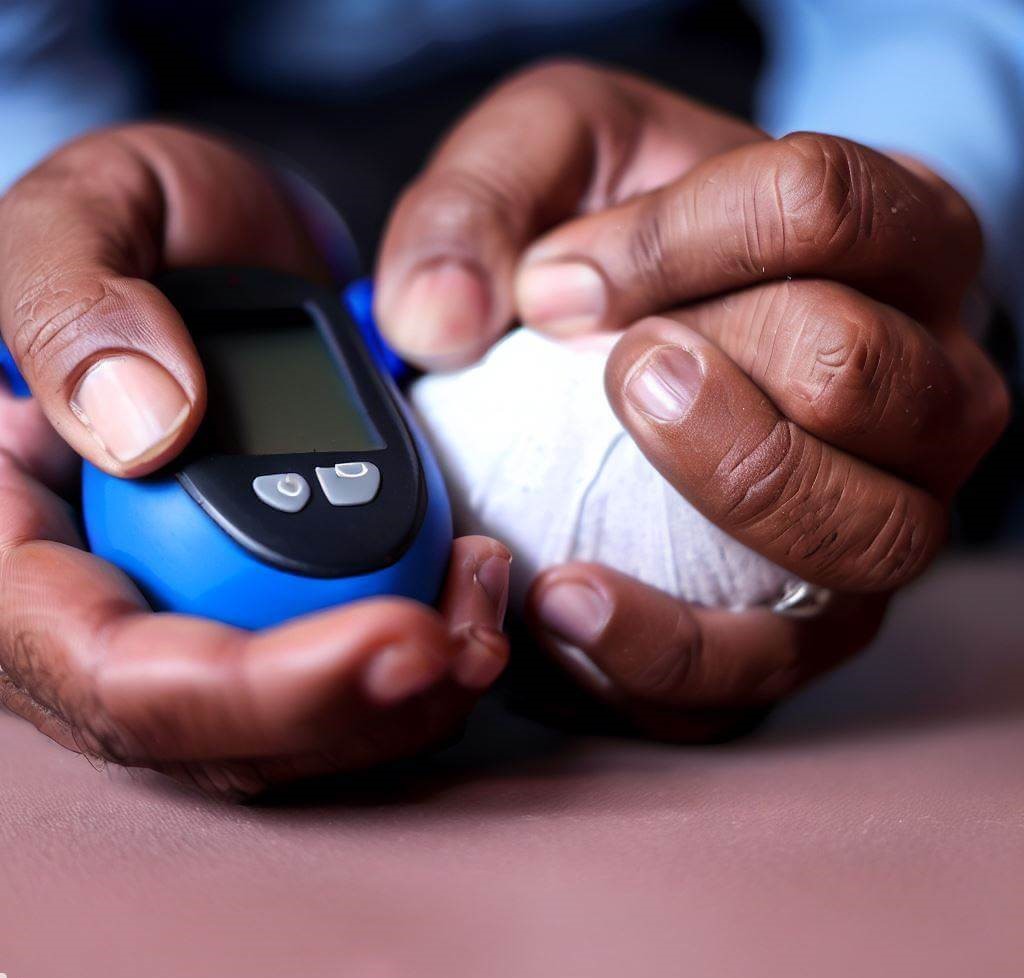Introduction: The Double Dilemma of Stress and Diabetes
Living with diabetes already presents its unique set of challenges. Throw in the unpredictability and pressures of daily life, and you’re dealing with a tricky duo. Diabetes doesn’t just interact with what you eat; it’s intricately linked to how you feel. Stress, with its shadowy presence, can sometimes be more challenging to pinpoint than a sugary snack, but its effects on blood sugar can be just as profound. Understanding how stress and diabetes feed into one another is vital, not just for effective diabetes management but also for maintaining overall well-being.
The Biology Behind Stress
Stress, though often seen as a psychological phenomenon, has deeply rooted biological mechanisms. The human body, in all its wisdom, has evolved to respond to threats, be it an impending deadline or a predator in the wild. But what happens when this age-old response meets a chronic condition like diabetes?
The Body’s Response to Stress
Our bodies are designed to react swiftly to immediate threats. Imagine our ancestors, faced with a wild animal. In such situations, the body had to decide in an instant: fight or flee? This is where the “fight or flight” response comes in. The adrenal glands, perched atop our kidneys, pump out adrenaline, leading to rapid heartbeat, heightened senses, and a surge of energy (glucose) for our muscles. It’s all systems go!
But there’s another player in the mix: cortisol. Released shortly after adrenaline, cortisol ensures that the body remains on high alert, primed for action. It helps replenish the body’s energy stores by increasing glucose levels in the bloodstream. Handy if you’re running from a lion, but not so much when the “threat” is a mounting pile of bills or an overflowing inbox.

Chronic vs. Acute Stress
Now, the occasional adrenaline rush isn’t necessarily bad. It can even be exhilarating (think roller-coaster rides or narrowly avoiding a mishap). This is acute stress – short-lived and sometimes even beneficial.
But problems arise when stress becomes a persistent backdrop to our lives. Imagine your body perpetually thinking it’s under threat. This constant “on” mode – known as chronic stress – can have numerous health implications. Persistent high levels of cortisol can lead to disrupted sleep, weight gain, high blood pressure, and you guessed it, trouble managing blood sugar levels. In the context of diabetes, this ongoing release of glucose, combined with potential insulin resistance due to elevated cortisol, becomes a significant concern. It’s like a tap that’s left open, continuously dripping and gradually causing a flood.
How Stress Directly Impacts Diabetes
As we venture deeper into the intertwined realms of stress and diabetes, it becomes apparent that they share a dance that’s as delicate as it is intricate. While the general premise is understood—stress influences blood sugar—it’s the nuances of this relationship that provide the keen insights required for effective diabetes management.
Blood Sugar Fluctuations
For anyone, stress causes the body to release glucose into the bloodstream. It’s a basic, primal response. But for someone with diabetes, this surge can be problematic. Whether it’s Type 1 or Type 2 diabetes, the issue arises when there isn’t enough insulin to cater to this sudden rise or when the body can’t use the insulin effectively.
Now, consider the many things that can trigger stress: a challenging day at work, family disagreements, health concerns, or even being stuck in traffic. These can lead to frequent and unpredictable spikes in blood sugar levels. Moreover, for individuals monitoring their blood sugar, these unexpected highs can be baffling if they aren’t attributing them to stress.
But, there’s a flip side. Stress can also cause blood sugar levels to plummet. How? People often resort to coping mechanisms when stressed. Some might skip meals or forget to take their medications, leading to dangerous lows. It’s a pendulum, and the balance can be elusive.
Stress Hormones and Insulin Resistance
It’s a bit of a cruel irony, really. Just when the body needs insulin the most to deal with the extra glucose, stress hormones make cells more resistant to it. Enter cortisol, our chronic stress companion. While it’s busy ensuring we have ample glucose in our blood, it’s also making our body’s insulin less effective. Insulin resistance means our cells can’t absorb glucose from the bloodstream as they typically would.
But why does this happen? In the grand scheme of evolution, insulin resistance during stress made sense. If our ancestors were under threat, the muscles needed quick energy (glucose) to react. Insulin resistance ensured that this energy wasn’t stored away but was readily available.
In today’s world, however, our threats are different, more psychological than physical. Our muscles aren’t necessarily using up that extra glucose. Instead, it remains in the bloodstream, leading to elevated blood sugar levels. Over time, if stress remains a constant, this state of ongoing insulin resistance can exacerbate diabetes, making it more challenging to manage and potentially leading to the need for increased medication.
Understanding this intricate dance between stress hormones and insulin is paramount. Recognizing the signs and being proactive can make a world of difference in one’s journey with diabetes.

Recognizing the Symptoms of Stress
Grappling with diabetes can sometimes feel like juggling – every new element introduced can throw off your rhythm. Stress is one such disruptive force, but understanding its manifestations can be empowering. By recognizing the symptoms early, you can take proactive measures, not just for diabetes management but for overall mental well-being.
Physical Signs
The body has a peculiar way of sounding the alarm when stress levels rise. These signals often manifest physically, and while they can vary from person to person, some common indicators include:
- Sleep Disturbances: Stress can lead to insomnia or broken sleep patterns. You may find yourself waking up multiple times in the night or struggling to drift off despite feeling exhausted.
- Appetite Changes: Some people may lose their appetite when stressed, while others might resort to comfort eating. Overeating, especially sugary or unhealthy foods, can directly impact blood sugar levels.
- Muscle Tension: A stiff neck, a persistent headache, or an aching back can all be indicators of stress. The muscles tend to tighten up, especially around the shoulders and neck, leading to discomfort or pain.
- Stomach Problems: Stress can upset your stomach, leading to indigestion, nausea, or even diarrhea. It’s not uncommon for individuals under chronic stress to suffer from recurring digestive issues.
- Increased Heart Rate: That racing heart isn’t always due to physical exertion. When stressed, you might notice an inexplicably faster heartbeat or even palpitations.
- Frequent Illnesses: Chronic stress can weaken the immune system, making you more susceptible to colds, infections, and other illnesses.
Emotional Responses
While the body gives us tangible, palpable signs, the mind too has its way of signaling stress. These emotional signs might be subtle, but they can be equally, if not more, debilitating:
- Irritability: Small things that wouldn’t usually bother you might start to become aggravating. A reduced patience threshold or snapping over trivial matters can be indicative of underlying stress.
- Feelings of Overwhelm: Tasks that you could handle before now seem insurmountable. Every little thing starts feeling like a massive mountain to climb.
- Mood Swings: Oscillating between emotions like sadness, anger, and happiness in a short span can be a red flag.
- Persistent Worrying: A constant sense of unease or always expecting the worst possible outcome—often referred to as catastrophizing—points to heightened stress levels.
- Detachment: Some people retreat inward when stressed. This might manifest as a lack of interest in previously enjoyed activities or avoiding social interactions.
- Feelings of Hopelessness: In extreme cases, chronic stress can lead to feelings of despair, worthlessness, or even depression.
Recognizing these signs is half the battle. While it’s easy to dismiss them as just ‘having an off day,’ repeated occurrences should not be ignored. Listening to what our body and mind convey can pave the way for interventions, ensuring that stress doesn’t gain an upper hand in the diabetes management journey.
Managing Stress for Better Diabetes Control
Understanding the close-knit relationship between stress and diabetes is the first step. The next, arguably more crucial step, is mastering the techniques to manage and reduce that stress. Achieving a state of calm not only benefits mental well-being but also has tangible benefits for diabetes control. Let’s delve into some proven strategies that can help you regain control.

Lifestyle Changes
Addressing the root causes of stress often starts with tweaking aspects of our daily routines. Here are some lifestyle changes that can have a profound impact:
- Regular Physical Activity: Exercise releases endorphins, which are natural mood lifters. Whether it’s a brisk walk, a session at the gym, or a yoga class, find an activity that you enjoy and make it a part of your routine. Not only does it help in stress relief, but physical activity can also aid in regulating blood sugar levels.
- Balanced Diet: What we consume has a direct impact on how we feel. Prioritize a balanced diet, rich in whole grains, lean proteins, and healthy fats. Reducing the intake of caffeine and sugar can also help in stabilizing mood swings caused by rapid changes in blood sugar levels.
- Adequate Sleep: Ensure you’re getting 7-9 hours of quality sleep each night. A well-rested body and mind can cope better with stressors and help in making more rational decisions, especially concerning diabetes management.
- Time Management: Feeling perpetually “busy” or “rushed” is a significant stress trigger for many. Learn to prioritize tasks, set realistic goals, and allocate specific blocks of time for relaxation.
- Limit Stimulants and Alcohol: While they might offer temporary relief, excessive caffeine or alcohol can heighten stress and anxiety. Plus, they can interfere with diabetes medications and blood sugar levels.
Medical Interventions
Sometimes, managing stress requires more than just lifestyle tweaks. Don’t shy away from seeking medical help when needed:
- Counseling: Talking to a professional can provide you with tools and strategies to cope with stress. They offer a neutral perspective and can guide you in understanding and managing your reactions to stressors.
- Medication: Some individuals benefit from medications that treat symptoms of stress, anxiety, or related conditions. Always consult with a healthcare provider about potential interactions with diabetes medications.
Mindfulness and Meditation
The ancient practices of mindfulness and meditation have now been backed by modern science for their stress-reducing benefits:
- Mindfulness: This practice is all about staying present and fully engaging with the here and now. It can be as simple as savoring the taste of your food, enjoying the sensation of fresh air on your face, or paying attention to your breathing. Mindfulness helps in breaking the cycle of rumination that often accompanies stress.
- Meditation: Setting aside a few minutes each day for meditation can make a world of difference. Meditation helps in achieving a state of deep relaxation, where the focus is shifted away from the hustle and bustle of daily life. Guided meditation, deep breathing exercises, or even apps dedicated to meditation can be useful starters.
- Progressive Muscle Relaxation: This technique involves tensing and then relaxing different muscle groups. It helps in grounding your thoughts and is particularly effective for those who experience physical symptoms of stress.
Stress, when left unchecked, can wreak havoc on one’s life and health, especially when juggling with a condition like diabetes. But with a proactive approach, armed with the right tools and knowledge, it’s entirely possible to keep stress at bay and enjoy a balanced, healthy life. Remember, it’s not about eliminating all stress but mastering how to manage it.
Conclusion: The Road to Calmer Days and Steady Blood Sugars
Life’s ebb and flow are inevitable, and the dual challenges of stress and diabetes can indeed seem overwhelming at times. However, recognizing the intimate dance between these two can empower you to make well-informed decisions and establish a balance. While the journey might be studded with challenges, the path ahead is filled with opportunities for better health and peace of mind. By harnessing effective stress-management tools, fostering self-awareness, and seeking appropriate interventions when needed, it is possible to cultivate an environment where both the mind and body thrive. Remember, every step towards managing stress is also a stride towards better diabetes control. Embrace the journey, and let each day be a testament to your resilience and strength.
FAQs
- How can I differentiate between normal daily stress and chronic stress?
- Daily stressors are fleeting and often tied to specific events, like traffic jams or meeting deadlines. Chronic stress lingers, affecting your mental and physical health over an extended period, often due to ongoing situations like financial troubles or constant work pressures.
- Do relaxation techniques like deep breathing really work in managing stress?
- Absolutely! Deep breathing, among other relaxation techniques, activates the body’s relaxation response, leading to a reduction in heart rate and blood pressure. Over time, these practices can be beneficial in reducing overall stress levels.
- Can I adjust my diabetes medication if I’m feeling stressed?
- You should never adjust your diabetes medication without consulting your healthcare provider. Stress can affect blood sugar levels, but self-adjusting medications can lead to complications. Always discuss changes in your health or emotional state with your doctor.
- How does exercise help in reducing stress-related blood sugar spikes?
- Exercise helps muscles take up more glucose, reducing blood sugar levels. Furthermore, physical activity boosts the production of endorphins, natural mood lifters that can alleviate feelings of stress.
- Are there specific foods I should avoid to reduce stress?
- While there’s no “one-size-fits-all” answer, it’s beneficial to reduce intake of caffeine, alcohol, and sugar-rich foods. These can induce mood swings, heighten anxiety, and interfere with sleep patterns, potentially escalating feelings of stress.




